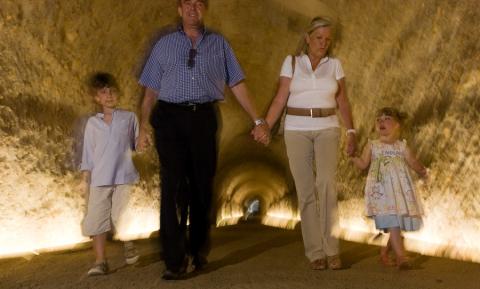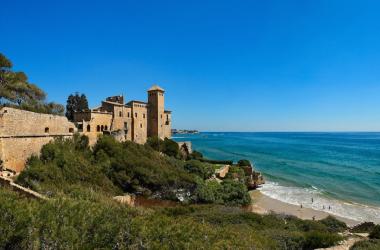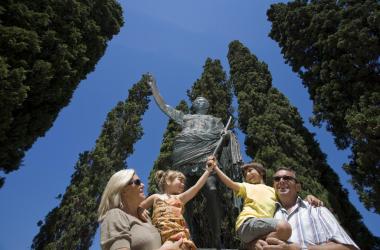Bar Cortijo, naturally wine
Discover El Cortijo, part of Tarragona's identity, good food and the best natural wines
At the El Cortijo bar, you can hear a telephone conversation coming from the kitchen: "The volatile part has gone, his red wine is very vinegary. I think that this time he has fallen asleep a bit". The speaker is Santos Masegosa, one of the great authorities in our country on the subject of natural wines, owner of the business together with his brother and in charge of the kitchen.
When it opened its doors at the end of the 70s, El Cortijo was the resting place for the dockers who arrived looking for a good fork lunch, a hearty, calorific meal to help them get through the day. With the relocation of the port and the retirement of that port clientele, the Masegosa brothers, Luis and Santos, had no choice but to adapt the business. An intuition led Santos to start serving natural wines in the bar. Joan Ramon Escoda, of the Escoda-Sanahuja winery in Prenafeta, and Laureano Serres, who has his winery in Pinell de Brai, had introduced him to this world, starting a tour of small wineries and fairs to get to know a different reality to that of the more commercial wine, more intervened by oenologists. "It's a world that grabs you, behind these wines there are extraordinary people with an honest discourse and a great vision of the territory", says Santos.
Producer Laureano Serres says that a natural wine is a wine with maximum intervention. The definition is just the opposite, wines that only contain fermented grape juice, in which there is no chemical intervention, neither in the vineyard nor in the winemaking process in the winery. "But of course, the winemaker has to be on top of the whole process, in the field, in the fermentation, in the transfer; in the winery he has to be very attentive. So we can say that the intervention is maximum", explains El Cortijo's chef.

A reference in the kitchen and in the world of wine
Thanks to popular events such as Dixie & Callos (tripe), l'Espineta amb cargolins (tuna with smalls snails) - which led to the recovery of this traditional recipe from the festivities in honour of Santa Tecla -, Quina Barra or the Bacchanal of Wines, this home-made cuisine with honest wines has made a place for itself in the gastronomic panorama of Tarragona. Time has proved it right and El Cortijo has positioned itself as a reference point in this unstoppable trend in the world of wine. Today, it is not difficult to see people coming from the other side of the world to try new wines in this rogue tavern that was once a brothel in the 1970s: people from California, Australia, New Zealand, Japan, South Africa, France, Portugal and, most recently, a sommelier from South Korea have visited El Cortijo. The Masegosa brothers believe that these visits, which make El Cortijo known through social networks and word of mouth, are aimed at respecting the tradition expressed through a cuisine inherited from the family and wines made in the same way as hundreds of years ago.

The production of great wines in Tarragona
Tarragona has traditionally been a city linked to the world of wine. In many of the houses in the historic centre, wine was produced only a few decades ago. Today, great natural wines are being made in the province of Tarragona. Santos highlights, in addition to the already mentioned Escoda-Sanahuja and Laureano Serres, the wineries 9+ in La Nou de Gaià, Sanromà in Vila-rodona, Tanca els Ulls and Dasca Vives in Nulles, Tuets in Pont d'Armentera o Pinyolet and Nini in Rasquera. Several restaurants in Tarragona have followed the path opened by El Cortijo and are serving natural wines in their premises: the Quidel bar, the Cup Vell, the Japanese restaurant O'Hashi or El Tamboret are some of those who frequently pass by this simple bar located in the Port district to share references and new discoveries.

Eating, drinking and much more at El Cortijo
As well as drinking, El Cortijo is also a great place to eat. You won't find bacon and cheese there, but you will find Pancetamol, a bacon with many hours of cooking behind it, a little vermouth and white wine and a generous use of spices to give it an Asian touch. Good fish, peas with black pudding, omelettes made with whatever is at hand or potatoes with home-made mustard are a must at this bar. Good humour and a certain healthy irreverence are also part of the menu. It has become normal for Santos to end up sitting at your table to share one of these wines with small defects that are never the same. But as he says, who doesn't have flaws? The opposite would be very boring.
When the diners seem to be satisfied, the Masegosa brothers suggest moving on to the "primo dolce", which, depending on the day, could be tripe with chickpeas or stewed pig's trotters. Visiting El Cortijo is much more than just eating and tasting new wines, it is more like a kind of therapy, probably the most effective of all, that which consists of sharing food and laughter with the people you care about. It is said that some evenings, after opening one of these bottles with bubbles from spontaneous fermentation, you can hear singing coming from upstairs, voices humming, a little out of tune and out of tune, the lyrics of the Irish folk song Molly Malone. Some even claim to have heard a Verdi aria.









